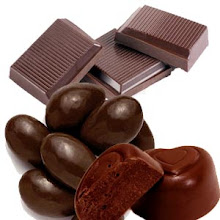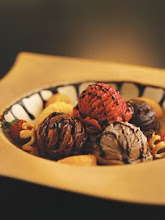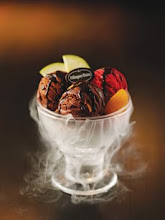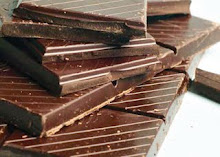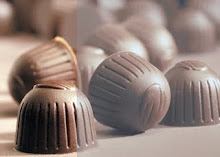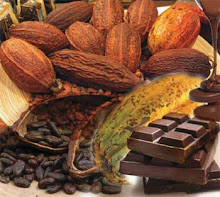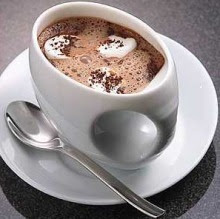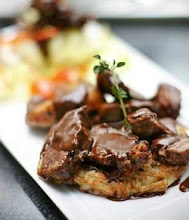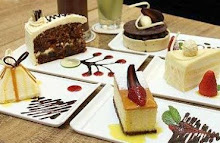Friday, August 31, 2012
chocolate may have a somewhat decreased risk of suffering a stroke
NEW YORK: Men who regularly indulge their taste for chocolate may have a somewhat decreased risk of suffering a stroke, according to a study yesterday.
Swedish researchers found that of more than 37,000 men followed for a decade, those who ate the most chocolate had a 17 percent lower risk of stroke than men who avoided chocolate.
The chocolate-loving group typically had the equivalent of a third of a cup of chocolate chips each week.
The study, published in the journal Neurology, is hardly the first to link chocolate to cardiovascular benefits. Several have suggested that chocolate fans have lower rates of certain risks for heart disease and stroke, like high blood pressure.
But those studies do not prove that chocolate is the reason. And the new one, funded by the Swedish Council for working Life and Social Research and the Swedish Research Council, doesn’t either, according to a neurologist not involved in the study.
“It’s very important for people to take the news on chocolate with a grain of salt,” said Dr. Richard B. Libman, vice chair of neurology at the Cushing Neuroscience Institute in Manhasset, New York.
The study was well done, Libman told Reuters Health, but it’s what researchers call an observational study. That means investigators look for patterns, like whether chocolate lovers have fewer strokes. The results cannot prove cause-and-effect.
That, Libman said, would take a controlled clinical trial, where people would be randomly assigned to eat chocolate or not, without knowing what they were eating, then followed to see what their stroke rates were over time.
“I don’t think a trial like that will ever be done,” he said.
For one, Libman noted, that would mean feeding people a good dose of sugar, fat and calories for a long time.
The current findings are based on 37,100 Swedish men ages 49 to 75 who reported on their usual intake of chocolate and other foods. Over the next 10 years, 1,995 men suffered a first-time stroke.
Among men in the top 25 percent for chocolate intake, the stroke rate was 73 per 100,000 men per year.
That compared with a rate of 85 per 100,000 among men who ate the least chocolate, report the researchers, led by Susanna Larsson of the Karolinska Institute in Stockholm.
Larsson’s team had information on some other factors – like the men’s weight and other diet habits, whether they smoked and whether they had high blood pressure. Even with those things considered, men who ate the most chocolate had a 17 percent lower stroke risk.
Still, Libman said, there could be unmeasured factors that would account for the chocolate-stroke connection.
It’s always possible, he noted, that men who ate chocolate were already in generally better health, and saw themselves that way. So they might have felt freer to “indulge” in chocolate than other men did.
‘Just a theory’
There are reasons to believe chocolate could have real effects. “The beneficial effect of chocolate consumption on stroke may be related to the flavonoids in chocolate,” Larsson said in a written release from the journal. (She could not be reached for comment.)
Flavonoids are compounds that act as antioxidants and may, based on studies, have positive effects on blood pressure, cholesterol and blood vessel function.
But Libman pointed out that the flavonoid theory is just that, a theory.
On top of that, chocolate does not corner the market on flavonoids. A range of plant foods contain various flavonoids – including many fruits (like berries, citrus and apples) and vegetables (like kale, spinach and broccoli), nuts, soy, tea and wine.
For now, Libman said the message is “everything in moderation.” If you already eat chocolate now and then, and your waistline does not seem to be suffering, there’s no reason to stop.
But adding the calories to your diet may not be wise. “You can’t start advising people to eat chocolate based on this,” Libman said. “Think of the negative effects that could result, like obesity and type 2 diabetes.”
For women who are wondering if the current findings might apply to them, Larsson’s team found similar results in a study of 33,000 Swedish women last year. But the same caveats also apply.—Reuters
Eating dark chocolates could reduce the chances of heart attacks and strokes
Heartwarming news for chocoholics
June 1, 2012
Eating dark chocolates could reduce the chances of heart attacks and strokes, a new study suggests.
LONDON: A scientific study likely to stir the souls of chocoholics has suggested that eating dark chocolate every day for 10 years could reduce the likelihood of heart attacks and strokes in some high-risk patients.
A team of researchers from Australia used a mathematical model to predict the long-term health impact of daily dark chocolate consumption in 2,013 people with a condition known as metabolic syndrome, which puts them at high risk of heart disease.
The team found that in the best case scenario—with no patient missing any daily portions—the treatment could potentially avert 70 non-fatal and 15 fatal heart attacks or strokes per 10,000 people over 10 years.
The model also suggested that mounting effective “dark chocolate prevention strategies” might cost an individual just US$40 a year.
The researchers, whose work was published in the British Medical Journal, stressed the protective effects have only been shown for dark chocolate containing at least 60% to 70% cocoa, not for milk or white chocolate. This is probably due to higher levels of flavonoids in dark chocolate.
But experts not involved in the study urged caution.
“Recommendations for daily consumption of dark chocolate … will certainly get people with metabolic syndrome excited, but at this point these findings are more hypothetical than proven, and the results need real-life data to confirm,” said Kenneth Ong at the Brooklyn Hospital Centre in the United States.
“I suspect that consuming dark chocolate every day for 10 years may have unintended adverse consequences,” he added. “The additional sugar and caloric intake may negatively impact patients in this study, who are overweight and glucose intolerant to begin with.”
All participants in the study, led by Christopher Reid at Monash University in Melbourne, had high blood pressure and metabolic syndrome, but had no history of heart disease or diabetes and were not on blood pressure lowering medication.—Reuters
chocolate may have a somewhat decreased risk of suffering a stroke
NEW YORK: Men who regularly indulge their taste for chocolate may have a somewhat decreased risk of suffering a stroke, according to a study yesterday.
Swedish researchers found that of more than 37,000 men followed for a decade, those who ate the most chocolate had a 17 percent lower risk of stroke than men who avoided chocolate.
The chocolate-loving group typically had the equivalent of a third of a cup of chocolate chips each week.
The study, published in the journal Neurology, is hardly the first to link chocolate to cardiovascular benefits. Several have suggested that chocolate fans have lower rates of certain risks for heart disease and stroke, like high blood pressure.
But those studies do not prove that chocolate is the reason. And the new one, funded by the Swedish Council for working Life and Social Research and the Swedish Research Council, doesn’t either, according to a neurologist not involved in the study.
“It’s very important for people to take the news on chocolate with a grain of salt,” said Dr. Richard B. Libman, vice chair of neurology at the Cushing Neuroscience Institute in Manhasset, New York.
The study was well done, Libman told Reuters Health, but it’s what researchers call an observational study. That means investigators look for patterns, like whether chocolate lovers have fewer strokes. The results cannot prove cause-and-effect.
That, Libman said, would take a controlled clinical trial, where people would be randomly assigned to eat chocolate or not, without knowing what they were eating, then followed to see what their stroke rates were over time.
“I don’t think a trial like that will ever be done,” he said.
For one, Libman noted, that would mean feeding people a good dose of sugar, fat and calories for a long time.
The current findings are based on 37,100 Swedish men ages 49 to 75 who reported on their usual intake of chocolate and other foods. Over the next 10 years, 1,995 men suffered a first-time stroke.
Among men in the top 25 percent for chocolate intake, the stroke rate was 73 per 100,000 men per year.
That compared with a rate of 85 per 100,000 among men who ate the least chocolate, report the researchers, led by Susanna Larsson of the Karolinska Institute in Stockholm.
Larsson’s team had information on some other factors – like the men’s weight and other diet habits, whether they smoked and whether they had high blood pressure. Even with those things considered, men who ate the most chocolate had a 17 percent lower stroke risk.
Still, Libman said, there could be unmeasured factors that would account for the chocolate-stroke connection.
It’s always possible, he noted, that men who ate chocolate were already in generally better health, and saw themselves that way. So they might have felt freer to “indulge” in chocolate than other men did.
‘Just a theory’
There are reasons to believe chocolate could have real effects. “The beneficial effect of chocolate consumption on stroke may be related to the flavonoids in chocolate,” Larsson said in a written release from the journal. (She could not be reached for comment.)
Flavonoids are compounds that act as antioxidants and may, based on studies, have positive effects on blood pressure, cholesterol and blood vessel function.
But Libman pointed out that the flavonoid theory is just that, a theory.
On top of that, chocolate does not corner the market on flavonoids. A range of plant foods contain various flavonoids – including many fruits (like berries, citrus and apples) and vegetables (like kale, spinach and broccoli), nuts, soy, tea and wine.
For now, Libman said the message is “everything in moderation.” If you already eat chocolate now and then, and your waistline does not seem to be suffering, there’s no reason to stop.
But adding the calories to your diet may not be wise. “You can’t start advising people to eat chocolate based on this,” Libman said. “Think of the negative effects that could result, like obesity and type 2 diabetes.”
For women who are wondering if the current findings might apply to them, Larsson’s team found similar results in a study of 33,000 Swedish women last year. But the same caveats also apply.—Reuters
Wednesday, June 30, 2010
www,halalmatch.com
www.halalmatch.com is where you search for your love,friends,life partner and many more
Sunday, April 18, 2010
Chocolate makers show off Syria's sweeter side
Chocolate makers show off Syria's sweeter side
Share
Ahmad Khatib
Wednesday, 14 April 2010 11:25
DAMASCUS – Belgium and Switzerland may be the current kings of chocolate, but Syrian confectioners believe another country deserves to be up there too, and already they are feeding an international sweet tooth.
Syria's traditional Arabic sweets are loved across the Middle East, and its people are famed for their culinary skills, with a rich cuisine built on the abundant produce of Damascus' fertile green belt, the Ghouta.
A shop assistant is seen displaying chocolate at the famous Ghraoui confectionery in Damascus.
But few realise it also makes first-class chocolate, with an export industry that is booming as the Syrian economy opens up to the world.
Despite long having had a reputation as the bad boy of Middle East politics, Syria is slowly emerging from international isolation. And among those taking the lead are Syrian confectioners.
"Why Syrian chocolate? Why not? What do countries like Switzerland and Belgium have that we in Syria don't have to make chocolate?" Bassam Ghraoui, who heads Syria?s most famous chocolate maker, told AFP.
"It's a big challenge, but the fact that we produce luxury chocolate which is double the price of Belgian chocolate, for example, is a sweet surprise for many people" because the high price reflects its high quality, he said.
"Best foreign chocolate"
The civil engineer turned entrepreneur said his father Sadek was the first to manufacture chocolate in the Middle East in the early 1930s.
Ghraoui, which also has shops in Arab countries, also sells dried fruits in Europe, including in outlets such as Harrods department store in London, and in Russia.
But now the family firm is facing competition from others such as Zenbarakji and Art Chocolate, which have also made forays into the global market.
"The Syrians have a rich heritage. We import cocoa from Africa, hazelnuts from Turkey and the rest is all Syrian," Ghraoui said of other local ingredients such as fruit and more nuts.
In 2005, his firm won the prestigious Prix d'Honneur for "best foreign chocolate" at the Salon du Chocolat in Paris, the world's largest annual chocolate show.
"At one Paris show, we ran out of chocolate samples because people loved our products," Ghraoui said, adding that 60 percent of the firm's production is exported -- and that figure could hit 80 percent in the future.
Ghraoui says it sells more than 30,000 kilograms (around 66,000 pounds) of chocolate a year to online customers in France alone through the websites of European partners.
Syria's chocolate industry
No government figures are available about the size of Syria's chocolate industry.
Other Syrian chocolatiers and confectioners are also making their mark.
"My father started to produce chocolate and other sweets in 1936, and our business has developed to this day," said Said Zenbarakji, owner of the Damascus-based Zenbarakji Company for Processing and Developing Chocolate and Sweets.
"The real competition started in 1990, when the company began to export chocolate to Arab countries likeLebanon, Egypt, Saudi Arabia and Qatar," he said of the family firm's decision to take on other local firms.
Around 10 years ago, Zenbarakji also began sending its wares abroad to Europe, Canada, Brazil and Hong Kong.
"Our products are entirely made in Syria, and there is no doubt that Syrian chocolate can compete and is in demand abroad," he said.
According to Khalid Sammani, owner of the Aleppo-based Art Chocolate company, another family business that was launched in 1923, "we face strong competition locally and internationally."
"We sell our chocolate in Arab countries, America and Canada, and it's not an easy thing to do but Syrian chocolate is still in demand and we are making progress."
At home, the customer base remains strong.
"It's so good, and I am almost addicted to it," said one cheerful woman at a Ghraoui shop in Damascus as she enjoyed a piece of palmyra – dates filled with almond and coated with dark chocolate.
"It doesn't help me diet as you can see, but I can't help it," she said of the luscious speciality, named after Syria's ruined and famed desert city on the ancient Silk Road from China to the Mediterranean. — AFP
Share
Ahmad Khatib
Wednesday, 14 April 2010 11:25
DAMASCUS – Belgium and Switzerland may be the current kings of chocolate, but Syrian confectioners believe another country deserves to be up there too, and already they are feeding an international sweet tooth.
Syria's traditional Arabic sweets are loved across the Middle East, and its people are famed for their culinary skills, with a rich cuisine built on the abundant produce of Damascus' fertile green belt, the Ghouta.
A shop assistant is seen displaying chocolate at the famous Ghraoui confectionery in Damascus.
But few realise it also makes first-class chocolate, with an export industry that is booming as the Syrian economy opens up to the world.
Despite long having had a reputation as the bad boy of Middle East politics, Syria is slowly emerging from international isolation. And among those taking the lead are Syrian confectioners.
"Why Syrian chocolate? Why not? What do countries like Switzerland and Belgium have that we in Syria don't have to make chocolate?" Bassam Ghraoui, who heads Syria?s most famous chocolate maker, told AFP.
"It's a big challenge, but the fact that we produce luxury chocolate which is double the price of Belgian chocolate, for example, is a sweet surprise for many people" because the high price reflects its high quality, he said.
"Best foreign chocolate"
The civil engineer turned entrepreneur said his father Sadek was the first to manufacture chocolate in the Middle East in the early 1930s.
Ghraoui, which also has shops in Arab countries, also sells dried fruits in Europe, including in outlets such as Harrods department store in London, and in Russia.
But now the family firm is facing competition from others such as Zenbarakji and Art Chocolate, which have also made forays into the global market.
"The Syrians have a rich heritage. We import cocoa from Africa, hazelnuts from Turkey and the rest is all Syrian," Ghraoui said of other local ingredients such as fruit and more nuts.
In 2005, his firm won the prestigious Prix d'Honneur for "best foreign chocolate" at the Salon du Chocolat in Paris, the world's largest annual chocolate show.
"At one Paris show, we ran out of chocolate samples because people loved our products," Ghraoui said, adding that 60 percent of the firm's production is exported -- and that figure could hit 80 percent in the future.
Ghraoui says it sells more than 30,000 kilograms (around 66,000 pounds) of chocolate a year to online customers in France alone through the websites of European partners.
Syria's chocolate industry
No government figures are available about the size of Syria's chocolate industry.
Other Syrian chocolatiers and confectioners are also making their mark.
"My father started to produce chocolate and other sweets in 1936, and our business has developed to this day," said Said Zenbarakji, owner of the Damascus-based Zenbarakji Company for Processing and Developing Chocolate and Sweets.
"The real competition started in 1990, when the company began to export chocolate to Arab countries likeLebanon, Egypt, Saudi Arabia and Qatar," he said of the family firm's decision to take on other local firms.
Around 10 years ago, Zenbarakji also began sending its wares abroad to Europe, Canada, Brazil and Hong Kong.
"Our products are entirely made in Syria, and there is no doubt that Syrian chocolate can compete and is in demand abroad," he said.
According to Khalid Sammani, owner of the Aleppo-based Art Chocolate company, another family business that was launched in 1923, "we face strong competition locally and internationally."
"We sell our chocolate in Arab countries, America and Canada, and it's not an easy thing to do but Syrian chocolate is still in demand and we are making progress."
At home, the customer base remains strong.
"It's so good, and I am almost addicted to it," said one cheerful woman at a Ghraoui shop in Damascus as she enjoyed a piece of palmyra – dates filled with almond and coated with dark chocolate.
"It doesn't help me diet as you can see, but I can't help it," she said of the luscious speciality, named after Syria's ruined and famed desert city on the ancient Silk Road from China to the Mediterranean. — AFP
Wednesday, November 18, 2009
Ice-cream indulgence
Ice-cream indulgence
Celebrate me-time with Haagen-Dazs new flavours in special limited edition creations
Ice-cream delights ...(from left) Mystique, Bliss and Desire.
WHAT better way to spend your much-deserved ‘me-time’ than by indulging in some delicious rich Haagen-Dazs ice cream.
"Me-time is important for everyone because we need to step out of the conundrum of life to pause, reflect and recharge. It helps us to focus on the simple pleasures in life," said Mandy Cheong, senior marketing manager of HD Marketing Sdn Bhd, at a media preview of Haagen-Dazs’ latest offerings – orange-flavoured dark chocolate ice cream and Haagen-Dazs Gateau.
The gateau is a mouth-watering dessert consisting of a choice of six single-serve ice-cream desserts that are encased in the finest quality chocolate.
The orange-flavoured dark chocolate ice-cream is a unique combination of very rich chocolate and an infusion of fresh orange bits.
You can enjoy this ice cream on its own or in special limited edition creations such as Lush (eight mini scoops with creamy chocolate sauce), Enchant (a coffee fantasia gateau served with scoops of dark chocolate orange and Belgian chocolate ice cream on a bed of mango sauce), and Mystique (scoops of dark chocolate orange and chocolate chip ice cream with raspberry sorbet and topped with chocolate sauce).
Other special limited edition creations include Paradise (layers of ice cream and wafers covered in chocolate sauce), Bliss (rich chocolate sauce over six scoops of ice cream), Desire (six scoops of ice cream in a flower-shaped waffle cone decorated with fruits and topped with chocolate sauce), and Cherish (a crispy waffle cone filled with a scoop of dark chocolate orange and macadamia nut ice cream and topped with a strawberry).
Urging ice-cream lovers to treat themselves to some valuable me-time, Cheong said it would, of course, be nice to escape to an island resort but such a retreat can sometimes be costly.
"In reality, taking time for ourselves can be about curling up in bed with a good novel, an unplanned movie outing with a girlfriend, a massage session or perhaps, treating yourself to a scoop of your favourite ice cream!"
She added that me-time is usually unplanned and spontaneous and is about enjoying that moment to its fullest.
Haagen-Dazs is now giving its customers the opportunity to kick back and relax at specially-created lounges at selected outlets but for a limited period only.
Not only can they enjoy the latest flavours, they can also get themselves pampered with a free manicure in the comfortable lounges.
The offer is valid for a purchase of RM10 or more on weekdays and RM20 or more during the weekends.
The first Haagen-Dazs lounge will open in Bangsar Village II in Kuala Lumpur from Nov 25 to 29; and in 1 Utama, Bandar Utama, from Dec 11 to Dec 24.
The dark chocolate orange creations are priced between RM21++ and RM35++ while the Haagen-Dazs Gateau comes in a single piece at RM23++ for dine-in or in boxes of three or five for takeaway with the five-piece box priced at RM100+. (There is no service charge for takeaways.)
Celebrate me-time with Haagen-Dazs new flavours in special limited edition creations
Ice-cream delights ...(from left) Mystique, Bliss and Desire.
WHAT better way to spend your much-deserved ‘me-time’ than by indulging in some delicious rich Haagen-Dazs ice cream.
"Me-time is important for everyone because we need to step out of the conundrum of life to pause, reflect and recharge. It helps us to focus on the simple pleasures in life," said Mandy Cheong, senior marketing manager of HD Marketing Sdn Bhd, at a media preview of Haagen-Dazs’ latest offerings – orange-flavoured dark chocolate ice cream and Haagen-Dazs Gateau.
The gateau is a mouth-watering dessert consisting of a choice of six single-serve ice-cream desserts that are encased in the finest quality chocolate.
The orange-flavoured dark chocolate ice-cream is a unique combination of very rich chocolate and an infusion of fresh orange bits.
You can enjoy this ice cream on its own or in special limited edition creations such as Lush (eight mini scoops with creamy chocolate sauce), Enchant (a coffee fantasia gateau served with scoops of dark chocolate orange and Belgian chocolate ice cream on a bed of mango sauce), and Mystique (scoops of dark chocolate orange and chocolate chip ice cream with raspberry sorbet and topped with chocolate sauce).
Other special limited edition creations include Paradise (layers of ice cream and wafers covered in chocolate sauce), Bliss (rich chocolate sauce over six scoops of ice cream), Desire (six scoops of ice cream in a flower-shaped waffle cone decorated with fruits and topped with chocolate sauce), and Cherish (a crispy waffle cone filled with a scoop of dark chocolate orange and macadamia nut ice cream and topped with a strawberry).
Urging ice-cream lovers to treat themselves to some valuable me-time, Cheong said it would, of course, be nice to escape to an island resort but such a retreat can sometimes be costly.
"In reality, taking time for ourselves can be about curling up in bed with a good novel, an unplanned movie outing with a girlfriend, a massage session or perhaps, treating yourself to a scoop of your favourite ice cream!"
She added that me-time is usually unplanned and spontaneous and is about enjoying that moment to its fullest.
Haagen-Dazs is now giving its customers the opportunity to kick back and relax at specially-created lounges at selected outlets but for a limited period only.
Not only can they enjoy the latest flavours, they can also get themselves pampered with a free manicure in the comfortable lounges.
The offer is valid for a purchase of RM10 or more on weekdays and RM20 or more during the weekends.
The first Haagen-Dazs lounge will open in Bangsar Village II in Kuala Lumpur from Nov 25 to 29; and in 1 Utama, Bandar Utama, from Dec 11 to Dec 24.
The dark chocolate orange creations are priced between RM21++ and RM35++ while the Haagen-Dazs Gateau comes in a single piece at RM23++ for dine-in or in boxes of three or five for takeaway with the five-piece box priced at RM100+. (There is no service charge for takeaways.)
Tuesday, August 18, 2009
Sweet balm for the heart
Sweet balm for the heart
HEART attack survivors who eat chocolate two or more times per week cut their risk of dying from heart disease about threefold compared to those who never touch the stuff, scientists have reported.
Smaller quantities confer less protection, but are still better than none, according to the study, which appears in the September issue of the Journal of Internal Medicine.
Earlier research had established a strong link between cocoa-based confections and lowered blood pressure or improvement in blood flow. It had also shown that chocolate cuts the rate of heart-related mortality in healthy older men, along with post-menopausal women.
But the new study, led by Imre Janszky of the Karolinska Institute in Stockholm, is the first to demonstrate that consuming chocolate can help ward off the grim reaper if one has suffered acute myocardial infarction – otherwise known as a heart attack.
"It was specific to chocolate – we found no benefit to sweets in general," said Kenneth Mukamal, a researcher at Beth Israel Deaconess Medical Centre in Boston and a co-author of the study.
"It seems that antioxidants in cocoa are a likely candidate" for explaining the live-saving properties, he said.
Antioxidants are compounds that protect against so-called free radicals, molecules which accumulate in the body over time that can damage cells and are thought to play a role in heart disease, cancer and the ageing process.
In the study, Janszky and colleagues tracked 1,169 non-diabetic men and women, aged from 45 to 70 years old, in Stockholm County during the early 1990s from the time they were hospitalised with their first-ever heart attack.
The results held true for men and women, and across all the age groups included in the study. Other factors that might have affected the outcome – alcohol consumption, obesity, smoking – were also taken into account.
So should we all be loading up on cocoa-rich sweets?
"I do encourage those who are looking for healthier desserts to consider chocolate in small quantities," Mukamal said.
"For individuals with no weight issues who have been able to eat chocolate in moderation and remain slim, I do not limit it," he added.
The researchers caution that clinical trials are needed to back up the findings of their study. In the meantime, however, a bit of chocolate may not be amiss, they suggest. – AFP
HEART attack survivors who eat chocolate two or more times per week cut their risk of dying from heart disease about threefold compared to those who never touch the stuff, scientists have reported.
Smaller quantities confer less protection, but are still better than none, according to the study, which appears in the September issue of the Journal of Internal Medicine.
Earlier research had established a strong link between cocoa-based confections and lowered blood pressure or improvement in blood flow. It had also shown that chocolate cuts the rate of heart-related mortality in healthy older men, along with post-menopausal women.
But the new study, led by Imre Janszky of the Karolinska Institute in Stockholm, is the first to demonstrate that consuming chocolate can help ward off the grim reaper if one has suffered acute myocardial infarction – otherwise known as a heart attack.
"It was specific to chocolate – we found no benefit to sweets in general," said Kenneth Mukamal, a researcher at Beth Israel Deaconess Medical Centre in Boston and a co-author of the study.
"It seems that antioxidants in cocoa are a likely candidate" for explaining the live-saving properties, he said.
Antioxidants are compounds that protect against so-called free radicals, molecules which accumulate in the body over time that can damage cells and are thought to play a role in heart disease, cancer and the ageing process.
In the study, Janszky and colleagues tracked 1,169 non-diabetic men and women, aged from 45 to 70 years old, in Stockholm County during the early 1990s from the time they were hospitalised with their first-ever heart attack.
The results held true for men and women, and across all the age groups included in the study. Other factors that might have affected the outcome – alcohol consumption, obesity, smoking – were also taken into account.
So should we all be loading up on cocoa-rich sweets?
"I do encourage those who are looking for healthier desserts to consider chocolate in small quantities," Mukamal said.
"For individuals with no weight issues who have been able to eat chocolate in moderation and remain slim, I do not limit it," he added.
The researchers caution that clinical trials are needed to back up the findings of their study. In the meantime, however, a bit of chocolate may not be amiss, they suggest. – AFP
Subscribe to:
Posts (Atom)
